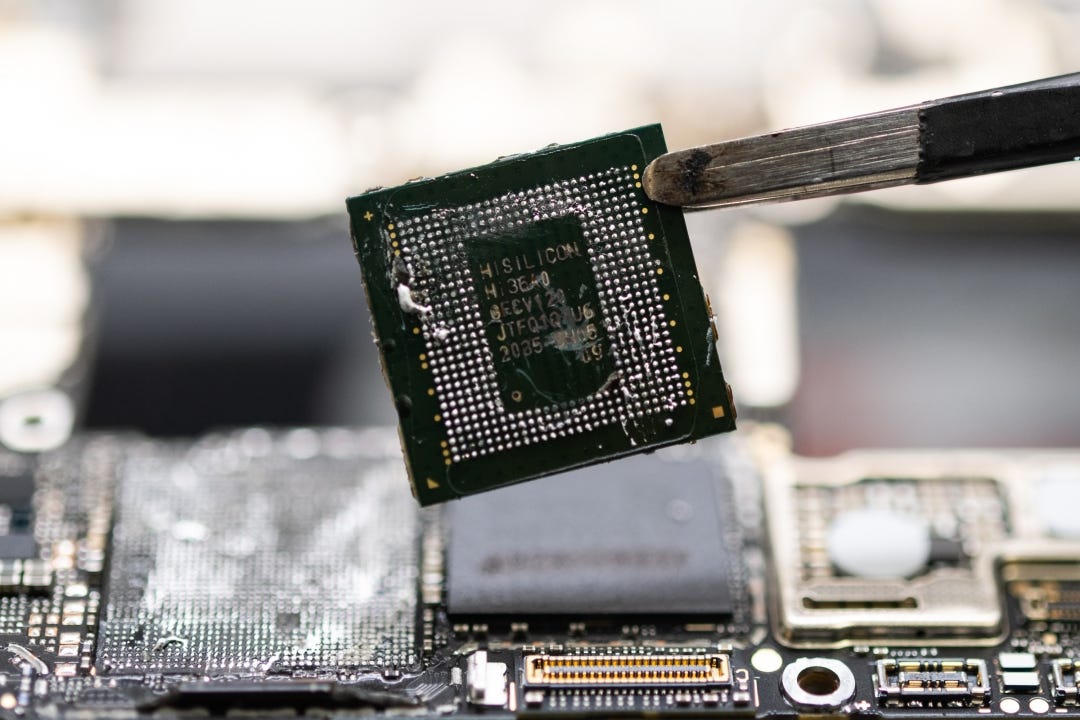Tech Insider: Mega Project Hints at Green Hydrogen’s Promise, China’s Solar Giants Keep Getting Bigger
U.S. lawmaker says SMIC ‘looks like’ it violated sanctions, can competitive video gaming make the Olympics?
A technician removes a Kirin 9000s chip fabricated in China by SMIC from a Huawei Mate 60 Pro smartphone on Sunday in Ottawa, Canada. Photo: James Park/VCG
Welcome to Caixin’s Tech Insider, your twice-weekly wrap on the movers, shakers and deal-makers in China’s tech scene.
Analysis: Mega project hints at green hydrogen’s vast potential
A mega solar-to-hydrogen factory has been commissioned in China, marking a milestone for the country’s effort to produce more green hydrogen, a fuel seen as key for slashing global greenhouse gas emissions.
The Sinopec Xinjiang Kuqa Green Hydrogen Pilot Project entered full operation in the western Xinjiang region, the plant’s operator Sinopec announced on Aug. 30.
China has stepped up its efforts to set up green hydrogen facilities in western parts of the country in recent years, Jin Boyang, senior analyst at data provider Refinitiv, told Caixin. The move can help China’s energy transition by preventing wind and solar power produced in the West from being wasted when the local power grids cannot take it in — by using it to make hydrogen, Jin said.
Caixin Explains: Why China’s solar giants are getting even bigger
China already controls more than 80% of the global solar market, but the country’s largest panel-makers are doubling down on their investments with expansion plans up and down the supply chain.
Betting on soaring demand for clean energy, Chinese solar companies are aggressively expanding both at home and abroad. Seven of the world’s largest solar module manufacturers have plans to grow their total installed capacity to 465 gigawatts by the end of this year.
They are betting on the future growth of solar power, which, along with wind, must account for 41% of the global power mix by 2030, analysts said.
Renewable energy is expected to surpass coal to become the largest source of global electricity by early 2025, according to the IEA.
China’s top chipmaker ‘looks like’ it violated sanctions, U.S. lawmaker says
China’s top chipmaker, Semiconductor Manufacturing International Corp. (SMIC), “warrants investigation” as the company appears to have violated U.S. sanctions by supplying components to Huawei Technologies Co. Ltd., an American lawmaker said.
“It sure looks like it did” violate sanctions, Representative Michael McCaul said Wednesday.
Huawei is using an advanced 7-nanometer processor built by SMIC to power its latest smartphone, according to analysis that TechInsights conducted for Bloomberg News, indicating that China is making headway in its push to produce cutting-edge semiconductors.
Existing rules require companies that intend to supply Huawei with any U.S. technology, which is present throughout SMIC’s operations, to get approval from Washington. It’s unclear whether SMIC has a U.S. license to supply Huawei.
Can competitive video gaming make the Olympics?
The International Olympic Committee (IOC) created a new commission focused on esports, the governing body of the Olympic Games said Tuesday.
The creation of the Esports Commission “underlines the IOC’s recognition of the tremendous potential that esports have to engage new audiences and provide new opportunities for athletes and fans”, the IOC said in a statement on its website.
The new commission is chaired by David Lappartient, a French politician and sporting administrator. Its members include notables from the sporting and tech worlds.
Virtual and simulated sports have become an increasingly important part of the sporting landscape in recent years, though esports are not in the Olympics.
Rise of China’s EV-makers threatens western auto industry, UBS says
Western automakers are set to lose a fifth of their global market share due to the unstoppable rise of more-affordable, cheaper-to-produce Chinese electric vehicles, according to UBS Group AG analysts.
Led by BYD Co. Ltd., Chinese carmakers will almost double their share of the auto market to 33% by the end of the decade, UBS analysts wrote in an Aug. 31 report, which also predicted Western automakers’ global market share will slump to 58% from 81% by 2030.
A UBS teardown of a 2022 BYD Seal sedan found that 75% of the components were manufactured in-house. The figure — double the global average — is the secret to BYD’s cost advantage in its quest to control its own fully integrated supply chain. The Seal is almost wholly made in China, with around 10% or less of parts from foreign suppliers, UBS estimates.
China fines top academic database $6.84 million
China’s cyber security regulator slapped the country’s largest academic database with a 50 million yuan ($6.84 million) fine for violations in handling personal information.
The operators of China National Knowledge Infrastructure (CNKI) and 14 related apps violated the principles of collecting only necessary personal information with consent, the Cyberspace Administration of China said Wednesday.
CNKI, with has more than 200 million research papers and owns 95% of copyrighted academic papers written in Chinese, said it has “sincerely” accepted the fine and will rectify its mistakes.
For the past two decades, CNKI has been embroiled in copyright disputes. In some cases, it has been accused of abusing its market power by preventing users from tapping into a service on its platform that checks for plagiarism or by charging excessive fees for the service.




